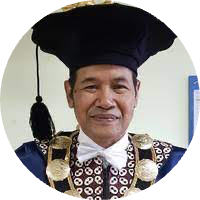Suten Games: Exploration of Empirical and Theoretical Probability for Junior High School Mathematics Learning
DOI:
https://doi.org/10.21831/ej.v4i1.59575Keywords:
Suten Games, Probability, Concept, Middle School StudentsAbstract
Suten is one of the local games often played for determining a purpose fairly. The game is played in pairs by choosing Elephant, Ant, or Man by each player. The choosing is one of the applications of the probability concept learned by students of the junior-high school. The use of the game in the instructional process can aid students in relating the probability concept they learn to real events. The objective of the present study is to explore the concepts of empirical and theoretical probabilities in the Suten game. The study is descriptive qualitative with an ethnographic approach to present detailed description and analysis concerning the Suten game in relation to probability material. Research results show the finding of the concepts of empirical and theoretical probabilities in the Suten game, especially in showing whether or not that Suten is a fair game. The game can be used in mathematics learning to introduce to students the concepts empirical probability, sample space, sample point, and theoretical probability. In addition, positive aspects can be obtained when the Suten game is integrated in learning such as, among others, inter-appraisal of decisions, training intuition, and using the abilities of creative thinking in searchimg for strategies.
References
Aldous, D., & Diaconis, P. (1986). Shuffling Cards and Stopping Times. The American Mathematical Monthly, 93(5). https://doi.org/10.2307/2323590.
D'Ambrosio. (2001). Mathematics across cultures: the history of non-Western mathematics. Springer Science & Business Media, 2. https://doi.org/10.5860/choice.38-5547.
d'Entremont, Y. (2015). Linking Mathematics, Culture and Community. Procedia - Social and Behavioral Sciences, 174. https://doi.org/10.1016/j.sbspro.2015.01.973.
Eyler, D., Shalla, Z., Doumaux, A., & McDevitt, T. (2009). Winning at Rock-Paper-Scissors. The College Mathematics Journal, 40(2), 125–128. https://www.jstor.org/stable/25653686
Freudenthal, H. (2006). Revisiting mathematics education: China lectures. Springer Science & Business Media, 2 . https://doi.org/10.1007/0-306-47202-3.
Ghiffary, R. F., Prasetyo, P., & Muslihah, D. (2019). Berani Menang Di Ronde Pertama Gunting-Batu-Kertas (Dare To Win On The First Round Of Scissor-Rock-Paper. Indonesian Fun Science Journal, 1(1), 177-186.
Inrevolzon. (2013). Kebudayaan dan Peradaban. Tamaddun: Jurnal Kebudayaan Dan Sastra Islam, 13(2). http://jurnal.radenfatah.ac.id/index.php/tamaddun/article/view/152.
Johnston, C. (2014). Scientists Find a Winning Strategy for Rock-Paper-Scissors. https://arstechnica.com/science/2014/05/win-at-rock-paper-scissors-by-knowing-thy-opponent/.
Karmadi, A. D. (2007). Budaya Lokal Sebagai Warisan Budaya dan Upaya Pelestariannya. http://kebudayaan.kemdikbud.go.id/bpnbyogyakarta/wp-content/uploads/sites/24/2014/11/Budaya_Lokal.pdf
Koparan, T. (2019). Teaching Game and Simulation Based Probability. International Journal of Assessment Tools in Education, 6(2), 235-258. https://doi.org/10.21449/ijate.566563.
Lubis, A. N. M. T., Widada, W., Herawaty, D., Nugroho, K. U. Z., & Anggoro, A. F. D. (2021). The ability to solve mathematical problems through realistic mathematics learning based on ethnomathematics. Journal of Physics: Conference Series, 1731(1). https://doi.org/10.1088/1742-6596/1731/1/012050.
Manfred, B., & Ramesh, K. (2009). Research and developments in probability education. International Electronic Journal of Mathematics Education, 4(3), 111-130. https://doi.org/10.29333/iejme/233.
Nelson, C., & Williams, N. (2020). Mathematical Explorations: A Fair Game? The Case of Rock, Paper, Scissors. Mathematics Teaching in the Middle School, 14(5). https://doi.org/10.5951/mtms.14.5.0311.
OECD (Organisation for Economic Co-operation and Development). (2003). The PISA 2003 Assessment Framework: Mathematics, Reading, Science and Problem Soloving Knowledge and Skills. OECD.
Patton, J. R., Cronin, M. E., Bassett, D. S., & Koppel, A. E. (1997). A Life Skills Approach to Mathematics Instruction: Preparing Students with Learning Disabilities for the Real-Life Math Demands of Adulthood. Journal of Learning Disabilities, 30(2). https://doi.org/10.1177/002221949703000205.
Prihartini, N., Puspita Sari, & Ibnu Hadi. (2020). Design Research: Mengembangkan Pembelajaran Konsep Peluang Dengan Pendekatan Pendidikan Matematika Realistik Indonesia Pada Siswa Kelas IX di SMPN 220 Jakarta. Jurnal Riset Pembelajaran Matematika Sekolah, 4(1). https://doi.org/10.21009/jrpms.041.01.
Pusmenjar. (2021). Framework asesmen kompetensi minimum (AKM). Pusat Asesmen dan Pembelajaran, Badan Penelitian, Pengembangan dan Perbukuan, Kementerian Pendidikan dan Kebudayaan.
Rahnang, R., Aditya, F., Merna, M., & Lidya, L. (2023). Traditional Game Module Development: An Alternative To Stimulate Early Childhood Language Development. Nazhruna: Jurnal Pendidikan Islam, 6(1), 139–158. https://doi.org/https://doi.org/10.31538/nzh.v6i1.2977.
Reiser, E. (2021). Comparing Probabilities: Rock, Paper, Scissors, and Coin Toss. Mathematics Teacher: Learning and Teaching PK-12, 114(9). https://doi.org/10.5951/mtlt.2021.0031.
Sari, D. L., Fitriani, D. A., Khaeriyah, D. Z., Hartono, & Nursyahidah, F. (2022). Hypothetical Learning Trajectory pada Materi Peluang: Konteks Mainan Tradisional Ular Naga. Mosharafa: Jurnal Pendidikan Matematika, 11 (2), 203–214. https://doi.org/10.31980/mosharafa.v11i2.1290.
Sharma, S. (2019). Probability explorations in a game context: The dice difference game. Statistic & Data Science Educator. https://researchcommons.waikato.ac.nz/bitstream/handle/10289/13113/SDSE19-002.pdf?sequence=5.
Sharma, S., Sharma, S., Doyle, P., Marcelo, L., & Kumar, D. (2021). Teaching and learning probability using games: A systematic review of research from 2010–2020. Waikato Journal of Education, 26(2). https://doi.org/10.15663/wje.v26i2.881.
Wedege, T. (2010, 26-27 January). Ethnomathematics and mathematical literacy : People knowing mathematics in society. Paper presented at The Seventh Mathematics Education Research Seminar, Linkí¶pings Universitet, Stockholm. http://urn.kb.se/resolve?urn=urn:nbn:se:mau:diva-11627.
Wilson, M. (2002). Six views of embodied cognition. Psychonomic Bulletin and Review, 9(4). https://doi.org/10.3758/BF03196322.
Downloads
Published
How to Cite
Issue
Section
Citation Check
License
The authors submitting a manuscript to this journal agree that, if accepted for publication, copyright publishing of the submission shall be assigned to Ethnomathematics Journal. However, even though the journal asks for a copyright transfer, the authors retain (or are granted back) significant scholarly rights.

Ethnomathematics Journal by https://journal.uny.ac.id/index.php/ethnomath is licensed under a Creative Commons Attribution-ShareAlike 4.0 International License.












